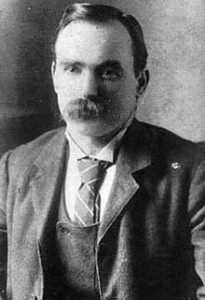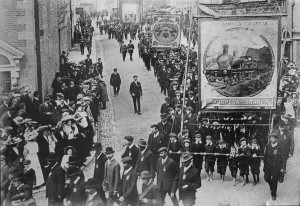January 15th Drogheda Marks Lockout Centenary and James Connolly Exhibition in TCD
‘Labor & Dignity – James Connolly in America’ Exhibition Launch at TCD
The Trinity Long Room Hub Arts and Humanities Research Institute is currently hosting an exhibition by New York University’s Glucksman Ireland House on the time that James Connolly spent in the United States between 1903 and 1910, where he witnessed the successes and failures of labor radicalism and unionization, and of working class conditions resulting from unregulated corporate expansion. The exhibition was funded by the Government of Ireland’s Department of Foreign Affairs and Trade as a contribution to Ireland’s Decade of Commemorations. To mark the launch of the exhibition in Trinity, Daphne Dyer Wolf will give a talk on the concept and research underpinning the exhibition on Wednesday, 15 January 2014 at 5.45pm in the Trinity Long Room Hub. Ms Wolf is a PhD Candidate in History and Culture at Drew University and curated the exhibition with Prof Marion Casey, faculty member at Glucksman Ireland House, NYU. All welcome.
http://www.tcd.ie/trinitylongroomhub/events/details/labor_and_dignity_exhibition.php
Drogheda revisted 1913 to 1916
The 2014 lecture programme of the Old Drogheda Society opens in spectacular fashion on Wednesday 15th January when the Society presents “Who Fears to Wear the Red Hand Badge?”, an illustrated talk about the Great Dublin Lock-Out of 1913, its local impact and its aftermath. The lecture will be held in the Governor’s House, Millmount, Drogheda at 8 p.m.
Francis Devine, the acclaimed labour historian, author, poet and singer and his colleague, Fergus Russell, will tell the story of the Lock-Out through the songs and stories of the time, accompanied by fascinating contemporary images. Francis has collected contemporary songs and poems relating to the dispute and the singing of these songs, most of which have not been heard for a century, will bring the events of Dublin city and county vividly to life. Representatives of the Millmount Research Unit will complement this exciting material with a parallel presentation on the reporting of the dispute in the local newspapers at the time. Although Drogheda was not directly involved in the cataclysmic events in the capital city, the story of the struggle of the farm labourers of North County Dublin for union recognition and for better wages and conditions cannot be separated from the better known events in Dublin. As well as telling this story in detail, the presentation will also deal with the conflict within the communities of North Dublin, the response of the Church to the industrial unrest and the political developments arising from the dispute that prepared the way for a refocusing on the National Question and opened the path to the 1916 Rising.


